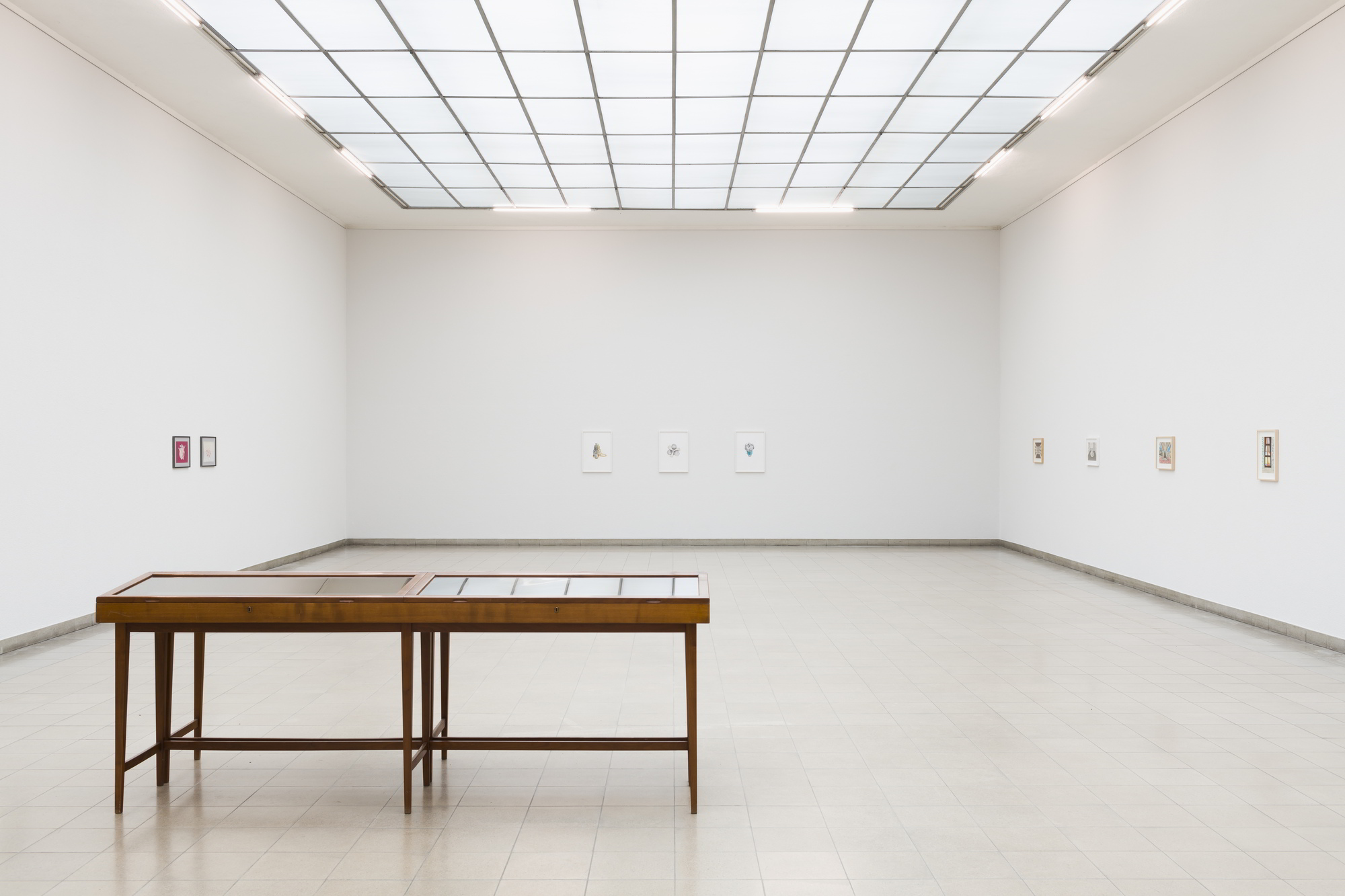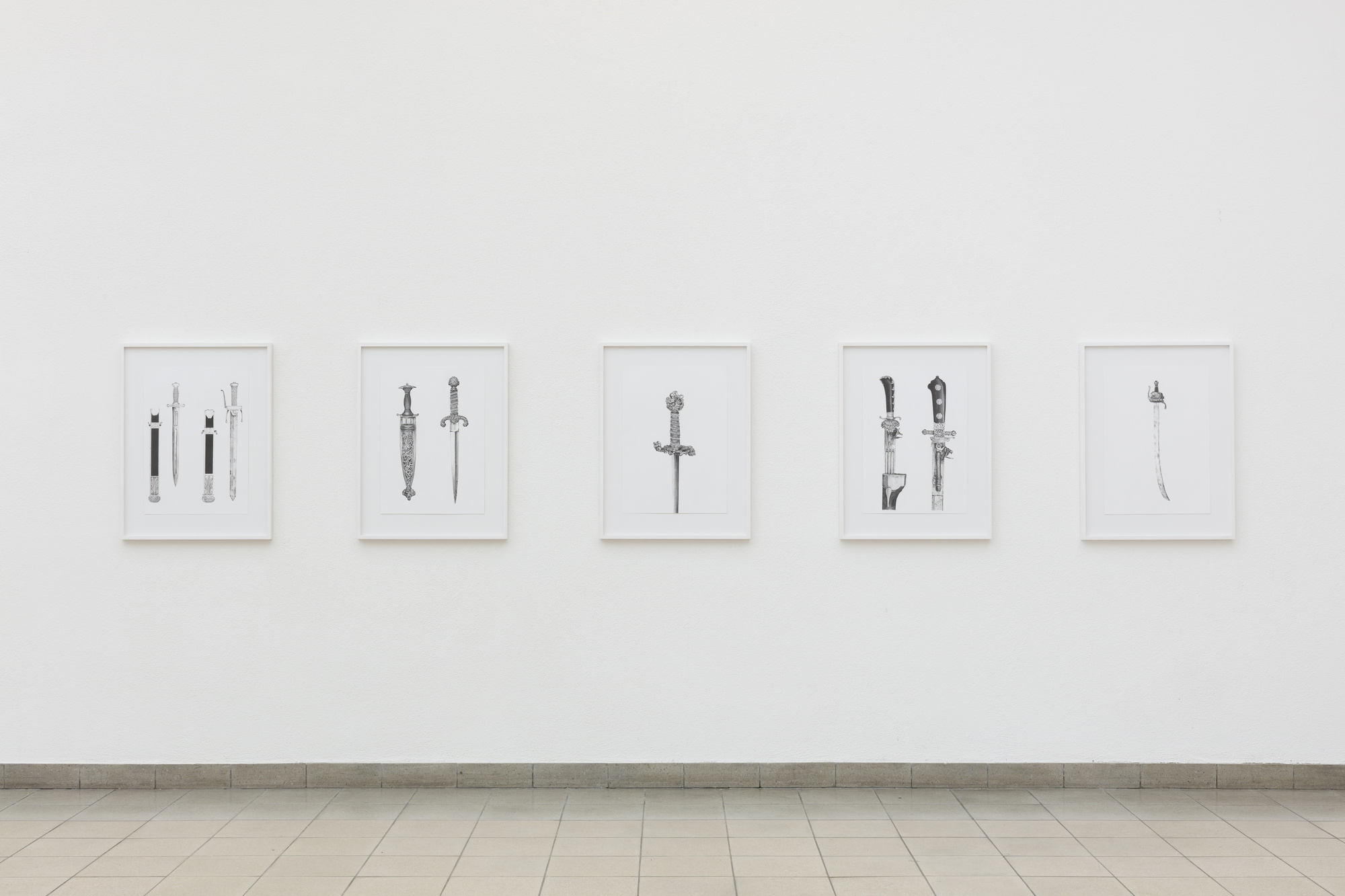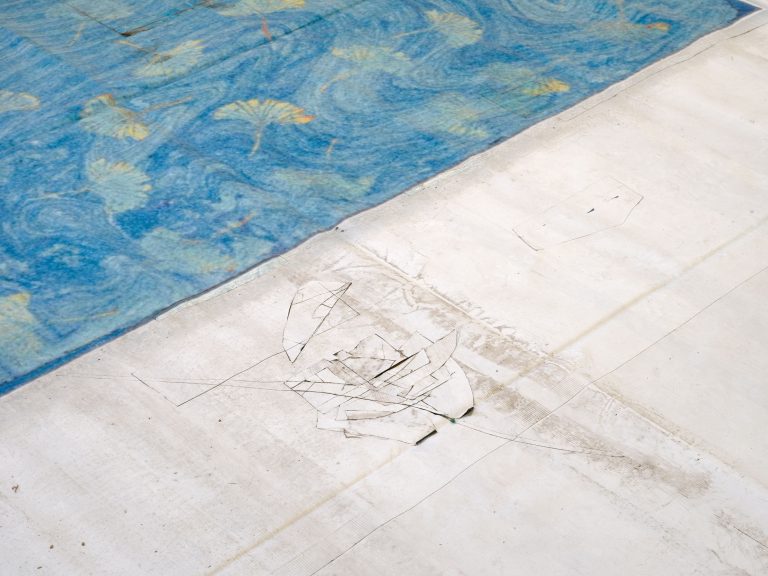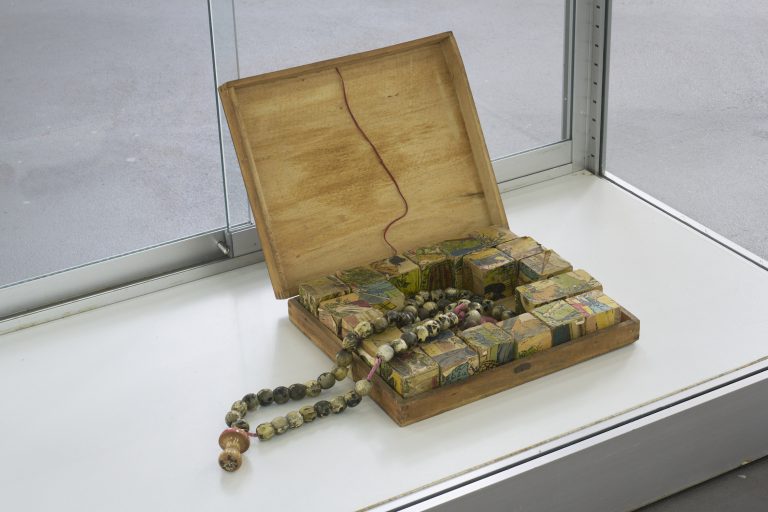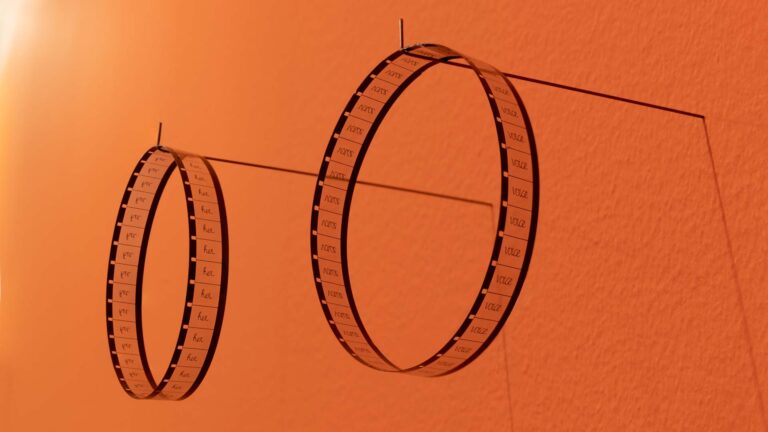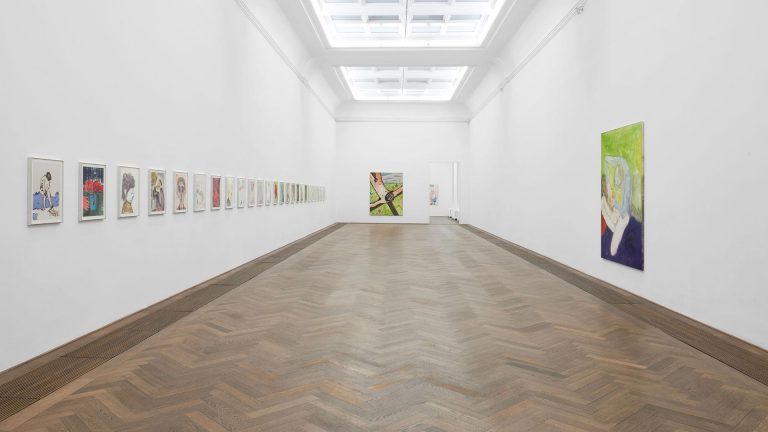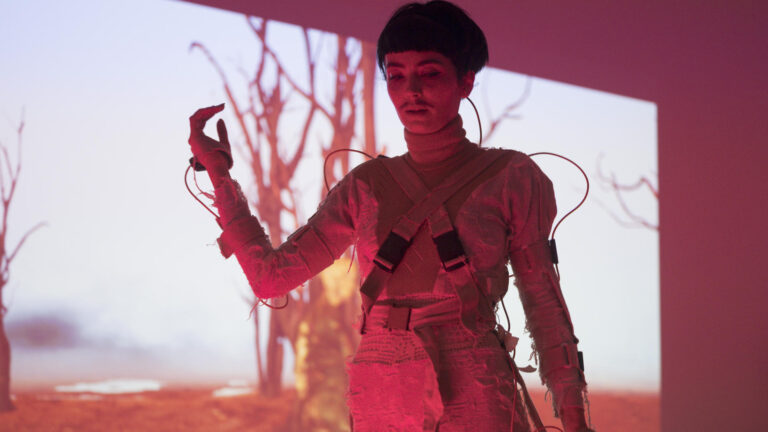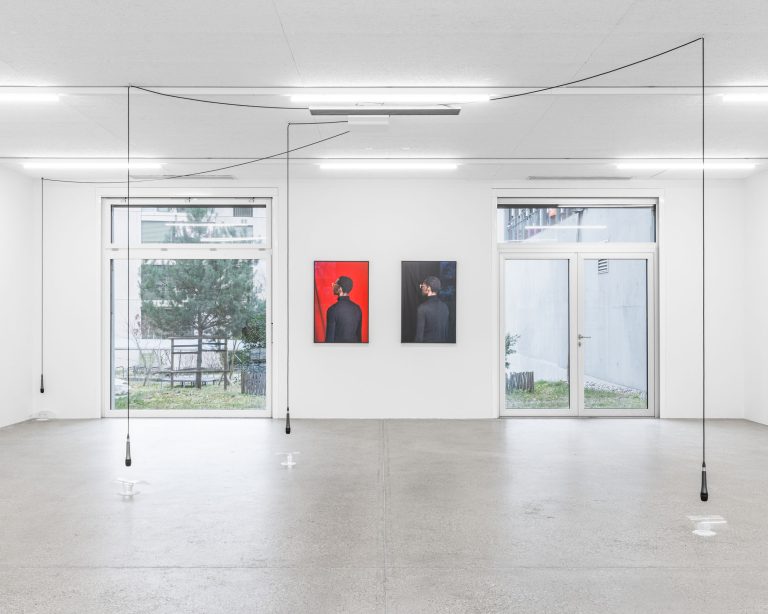Artist: Marta Riniker-Radich
Exhibition title: We, on the Other Hand, Can Do Everything Remotely
Venue: Kunsthaus Glarus, Glarus, Switzerland
Date: March 18 – May 13, 2018
Photography: all images copyright and courtesy of the artist and Kunsthaus Glarus
In Swiss artist Marta Riniker-Radich’s solo exhibition (b. 1982 in Bern, lives and works in Frankfurt am Main and Geneva), the medium of drawing encounters installative and text-based works. Drawings in vibrant colours depict fictional places out of time or altered and at the same time oddly familiar things with highly detailed scientific precision. Places alternating between comfort and control – single-family homes, entryways, facades, fluffy interiors – and objects such as safety locks, decorated cupcakes, or painted eggs (exaggeratedly) illustrate, abstract, and comment on the world around us. The works of Marta Riniker-Radich are based on research into the history of (and stakeholders in de facto), historical, social and economic structures.
The drawings depict obsessively domesticated spaces that are nevertheless uninhabited; a psychogeography devoid of people but one still full of desire. They are (fantastical) spaces of control situated between domestic-private and public space, in which the echoes of social structures linger. A speculative “We” that operates, lives, works and is disciplined within a specific, socio-political context and suffers at times from loneliness or isolation. The focus is not on intimacy, the private consequences of compulsions, obsessions, and emotions. Rather, Marta Riniker-Radich is interested in the “psychology” of actual economic contexts and socio-political phenomena and developments; in a zone of conflicting priorities between care and control, the self and regulations.
In recent years, for instance, series of works have been created on rural, anti-government organizations in the US or on the Texas oil industry. Although groups and individuals tied to such organizations are never depicted in the works themselves, in the void created by their absence, fictional portraits emerge of (male) individuals subjected to neoliberal desires in work and free time, of health and self-optimization, and who are also searching for other strategies of self-empowerment and justice. Serving as the point of departure for We, on the Other Hand, Can Do Everything Remotely are men’s (fictional) communities and “groupings” from the world of work and recreation. The exhibition brings together a selection of drawings, produced in the last ten years, with new works created for the Kunsthaus Glarus. In the physical exhibition space, subtle yet intrusive interventions, including tinted windows in the foyer and the basement, neon lights specially designed for the exhibition, a ceiling painted in the color of the floor, or the carefully renovated ramp at the entrance of the Schneelisaal, serve as links between fictional and real space.
The exhibition title We, on the Other Hand, Can Do Everything Remotely is a quote from a conversation on the nature of oil business work, which the artist held in Midland, Texas. It is an engineer’s description of his geographical distance to the location where raw material is effectively extracted; a remote working location compared to other physical forms of work in this industry. Relationships between power and control, distance and intimacy, and thus the associated forms of solidarity that are united into a “class,” provide the artist her focus in creating the various works of this exhibition against the backdrop of the Texas oil industry. Letters to Claytie (2018) are replicas of letters of recommendation for Clayton Williams, a businessman and former candidate for governor of Texas, in support of his inclusion in the Hall of Fame of the Permain Basin Petroleum Museum in Midland. Together the letters form the portrait of a powerful political and social figure who is at times sustained and “constituted” by a group. Strength resides in the hearts of the weak (2018), is an animation of an oversized ring also based on a replica: the ‘Aggie ring’, a fetishistic reference to and identifying mark of Texas A&M University graduates, is not only reserved for students with outstanding academic records, but also adorns the grounds of the university in the form of a monumental sculpture.
Other works also concentrate on the fetishization of various kinds of objects: It’s better to know a knot and not need it, than to need a knot and not know it is a collection of various safety and rescue knots made with blue rope. Caught open-endedly between aesthetic object and functional lesson, they reiterate the desire for control and certitude that lies at the heart of learning such knots. A highly sophisticated security blanket (2015), a series of highly detailed renderings of swords, fetishizes the insignia of individualized consumer culture: the (collector’s) objects. Sweat pours onto the dusty ground and turns it into salty muck (2015) depicts drill bits used for oil drilling, which resemble aggressive physical prosthetics here. Precisely drawn locks, functional tools for safeguarding the private, are, in The enemy within (2017), transformed into shiny jewelry-like, over-the-top objects, whose utilitarian function is of secondary importance. In depicting the “props” of such communities, these drawings, created in an elaborate, slow and disciplined way, clearly reveal forms of conditioning and desire. Not least, it is a desire to achieve the perfect body through forms of discipline, but also a desire for secure places of refuge, as Infinity training (2018) – a fragment of a gym locker – suggests.
A life by default (2018) portrays another anonymous protagonist who finds a safe haven in the rigid controls of everyday household life.
Marta Riniker-Radich, Kunsthaus Glarus: Marta Riniker-Radich – We, on the Other Hand, Can Do Everything Remotely, 2018, installation view ; Photo: Gunnar Meier
Marta Riniker-Radich, Kunsthaus Glarus: Marta Riniker-Radich – We, on the Other Hand, Can Do Everything Remotely, 2018, installation view ; Photo: Gunnar Meier
Marta Riniker-Radich, Kunsthaus Glarus: Marta Riniker-Radich – We, on the Other Hand, Can Do Everything Remotely, 2018, installation view; Photo: Gunnar Meier
Marta Riniker-Radich, Kunsthaus Glarus: Marta Riniker-Radich – We, on the Other Hand, Can Do Everything Remotely, 2018, installation view ; Photo: Gunnar Meier
Marta Riniker-Radich, Kunsthaus Glarus: Marta Riniker-Radich – We, on the Other Hand, Can Do Everything Remotely, 2018, installation view ; Photo: Gunnar Meier
Marta Riniker-Radich, Kunsthaus Glarus: Marta Riniker-Radich – We, on the Other Hand, Can Do Everything Remotely, 2018, installation view ; Photo: Gunnar Meier
Marta Riniker-Radich, Claytie, 2017, Kunsthaus Glarus: Marta Riniker-Radich – We, on the Other Hand, Can Do Everything Remotely, 2018, installation view; Photo: Gunnar Meier
Marta Riniker-Radich, Claytie, 2017, Kunsthaus Glarus: Marta Riniker-Radich – We, on the Other Hand, Can Do Everything Remotely, 2018, detail; Photo: Gunnar Meier
Marta Riniker-Radich, Claytie, 2017, Kunsthaus Glarus: Marta Riniker-Radich – We, on the Other Hand, Can Do Everything Remotely, 2018, detail; Photo: Gunnar Meier
Marta Riniker-Radich, Sweat pours onto the dusty ground and turns it into salty muck, 2015, Kunsthaus Glarus: Marta Riniker-Radich – We, on the Other Hand, Can Do Everything Remotely, 2018, installation view; Photo: Gunnar Meier
Marta Riniker-Radich, Sweat pours on to the dusty ground and turns into salty muck, 2017, Colored pencil and pencil on paper
Marta Riniker-Radich, Kunsthaus Glarus: Marta Riniker-Radich – We, on the Other Hand, Can Do Everything Remotely, 2018, installation view ; Photo: Gunnar Meier
Marta Riniker-Radich, Stop, drop and roll, 2017, Farb- und Bleistift auf Papier, Colored pencil and pencil on paper
Marta Riniker-Radich, Kunsthaus Glarus: Marta Riniker-Radich – We, on the Other Hand, Can Do Everything Remotely, 2018, installation view ; Photo: Gunnar Meier
Marta Riniker-Radich, Instashell, 2017, Colored pencil and pencil on paper
Marta Riniker-Radich, Assuming Fetal Position, 2017, Colored pencil and pencil on paper
Marta Riniker-Radich, Kunsthaus Glarus: Marta Riniker-Radich – We, on the Other Hand, Can Do Everything Remotely, 2018, installation view ; Photo: Gunnar Meier
Marta Riniker-Radich, Manhood, 2014, Colored pencil and pencil on paper
Marta Riniker-Radich, Kunsthaus Glarus: Marta Riniker-Radich – We, on the Other Hand, Can Do Everything Remotely, 2018, installation view ; Photo: Gunnar Meier
Marta Riniker-Radich, Untitled, 2009, Colored pencil and pencil on paper
Marta Riniker-Radich, Glenn McCarthy Goes to Sea, 2010, Colored pencil and pencil on paper
Marta Riniker-Radich, Strength resides in the hearts of the weak, 2018, 1-canal-video projection (colored, tonelessly); Photo: Gunnar Meier
Marta Riniker-Radich, A highly sophisticated security blanket, 2015, Kunsthaus Glarus: Marta Riniker-Radich – We, on the Other Hand, Can Do Everything Remotely, 2018,, installation view; Photo: Gunnar Meier
Marta Riniker-Radich, Kunsthaus Glarus: Marta Riniker-Radich – We, on the Other Hand, Can Do Everything Remotely, 2018, installation view ; Photo: Gunnar Meier
Marta Riniker-Radich, Kunsthaus Glarus: Marta Riniker-Radich – We, on the Other Hand, Can Do Everything Remotely, 2018, installation view ; Photo: Gunnar Meier
Marta Riniker-Radich, The enemy within, 2017, Kunsthaus Glarus: Marta Riniker-Radich – We, on the Other Hand, Can Do Everything Remotely, 2018, installation view; Photo: Gunnar Meier
Marta Riniker-Radich, The enemy within, 2017, Colored Pencil and Pencil on Paper; Photo: Gunnar Meier
Marta Riniker-Radich, The enemy within, 2017, Colored Pencil and Pencil on Paper; Photo: Gunnar Meier
Marta Riniker-Radich, It’s better to know a knot and not need it, than to need a knot and not know it, 2018, Kunsthaus Glarus: Marta Riniker-Radich – We, on the Other Hand, Can Do Everything Remotely, 2018, installation view; Photo: Gunnar Meier
Marta Riniker-Radich, It’s better to know a knot and not need it, than to need a knot and not know it, 2018, Kunsthaus Glarus: Marta Riniker-Radich – We, on the Other Hand, Can Do Everything Remotely, 2018, installation view; Photo: Gunnar Meier
Marta Riniker-Radich, It’s better to know a knot and not need it, than to need a knot and not know it, 2018, Kunsthaus Glarus: Marta Riniker-Radich – We, on the Other Hand, Can Do Everything Remotely, 2018, detail; Photo: Gunnar Meier
Marta Riniker-Radich, It’s better to know a knot and not need it, than to need a knot and not know it, 2018, Kunsthaus Glarus: Marta Riniker-Radich – We, on the Other Hand, Can Do Everything Remotely, 2018, detail; Photo: Gunnar Meier
Marta Riniker-Radich, Kunsthaus Glarus: Marta Riniker-Radich – We, on the Other Hand, Can Do Everything Remotely, 2018, installation view ; Photo: Gunnar Meier
Marta Riniker-Radich, Kunsthaus Glarus: Marta Riniker-Radich – We, on the Other Hand, Can Do Everything Remotely, 2018, installation view ; Photo: Gunnar Meier
Marta Riniker-Radich, Kunsthaus Glarus: Marta Riniker-Radich – We, on the Other Hand, Can Do Everything Remotely, 2018, installation view ; Photo: Gunnar Meier
Marta Riniker-Radich, Kunsthaus Glarus: Marta Riniker-Radich – We, on the Other Hand, Can Do Everything Remotely, 2018, installation view ; Photo: Gunnar Meier
Marta Riniker-Radich, Infinity training, 2018, Kunsthaus Glarus: Marta Riniker-Radich – We, on the Other Hand, Can Do Everything Remotely, 2018, installation view; Photo: Gunnar Meier
Marta Riniker-Radich, Infinity training, 2018, Kunsthaus Glarus: Marta Riniker-Radich – We, on the Other Hand, Can Do Everything Remotely, 2018, installation view; Photo: Gunnar Meier
Marta Riniker-Radich, Infinity training, 2018, Kunsthaus Glarus: Marta Riniker-Radich – We, on the Other Hand, Can Do Everything Remotely, 2018, installation view; Photo: Gunnar Meier
Marta Riniker-Radich, A life by default, 2018, Kunsthaus Glarus: Marta Riniker-Radich – We, on the Other Hand, Can Do Everything Remotely, 2018, installation view; Photo: Gunnar Meier
Marta Riniker-Radich, A life by default, 2018, Kunsthaus Glarus: Marta Riniker-Radich – We, on the Other Hand, Can Do Everything Remotely, 2018, installation view; Photo: Gunnar Meier
Marta Riniker-Radich, A life by default, 2018, Kunsthaus Glarus: Marta Riniker-Radich – We, on the Other Hand, Can Do Everything Remotely, 2018, installation view; Photo: Gunnar Meier







